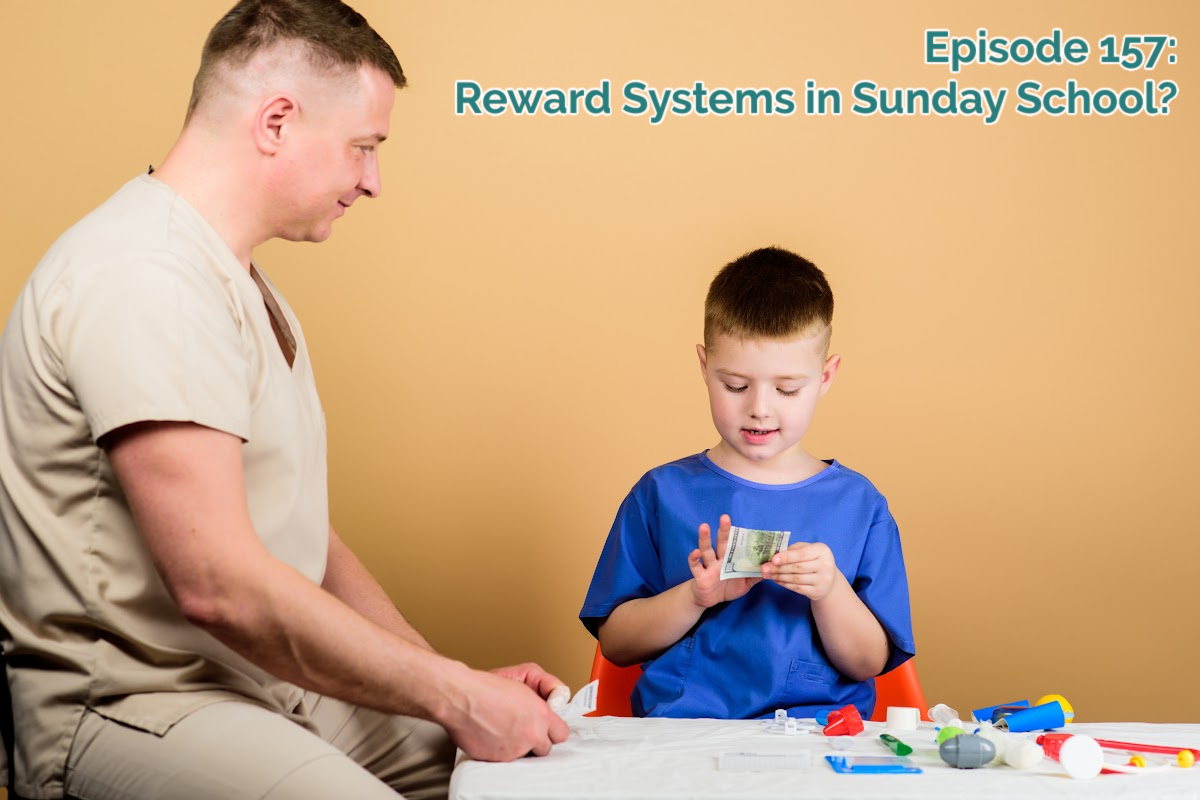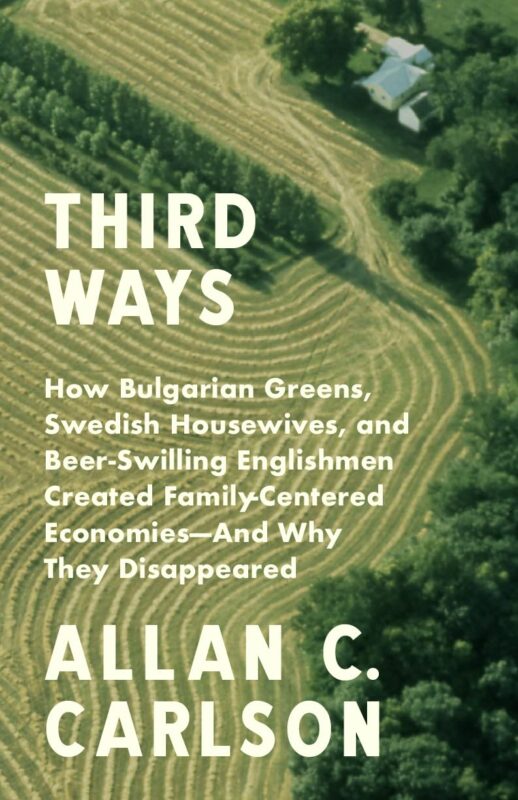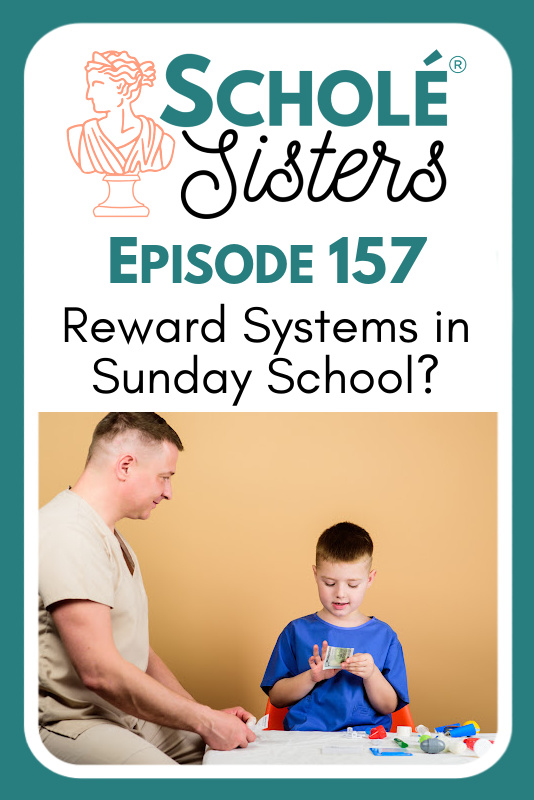SS#157 – Reward Systems in Sunday School
This episode began with a post inside the Sistership that we couldn’t ignore. It touches on a question many moms wrestle with, especially when they’re trying to raise thoughtful, intentional kids in a culture—even a church culture—that often defaults to behavior management.
A mom asked how she should respond to a Sunday school program that gives kids play money for bringing their Bibles, answering questions, and participating—money they can use to “buy” toys or candy. It sounds harmless enough, but what if that reward system shapes their motivation for attending in the first place?
We’ve talked before about the problems with reward systems and behaviorism—Charlotte Mason had a lot to say on this. So in this episode, we unpack why these systems are appealing, why they can be problematic, and how to wisely respond when you can’t change the system yourself.
We share stories, principles, and encouragement for making faithful choices without perfectionism or drama. Whether or not your kids attend Sunday school, this conversation is about more than a specific program—it’s about training our children to love what matters.
Sunday School Troubles
Today’s Hosts and Source
Scholé Every Day: What We’re Reading
Third Ways: How Bulgarian Greens, Swedish Housewives, and Beer-Swilling Englishmen Created Family-Centered Economies—and Why They Disappeared by Allan C. Carlson
Mystie read this exploration of historical alternative economic movements that rejected both capitalism and socialism in favor of family-centered economies.
Formation of Character by Charlotte Mason
Brandy is reading this timely work that offers insights on how parenting should adapt when children become young adults, such as daughters returning home from “finishing school.”
Devolution: A Firsthand Account of the Rainier Sasquatch Massacre by Max Brooks
Abby is reading a little satirical horror novel with social commentary about modern green utopias, self-reliance, and civilization’s fragility. Fun!
Reward systems in Sunday School
A mom inside the Sistership asked how to respond to her church’s new Sunday school incentive program. Children receive play money for bringing Bibles, answering questions, and participating. They exchange it for toys or candy. At first glance, it seems like harmless motivation. Yet her kids began talking more about what they could buy than about Scripture or fellowship. She felt uneasy.
Many of us understand the appeal of these systems. They offer a quick fix and often produce visible results. However, ease and effectiveness in the moment do not guarantee good formation over time.
Charlotte Mason warned against motivating children through manipulation. She believed habits and behavior should be trained through the will, not through rewards or punishments. When a child behaves to gain a prize, the prize becomes the object of love. The behavior itself holds no lasting value unless rightly ordered.
Church volunteers likely mean well. They want attentive children, full classrooms, and positive experiences. Rewards seem to help. Yet what message does the system send? It teaches that obedience and spiritual engagement are worth something only when external incentives exist. It shifts the focus from loving truth to chasing prizes.
Parents should notice what motivates their children. Do they talk about the lesson or about the candy? Are they forming godly habits or learning to perform for payoff? When that pattern emerges, the next step is discernment.
Faithful responses vary. Some families might opt out of the program entirely. Others might train their children to participate without receiving the prize. Some might raise quiet concerns to church leadership. All families can talk to their children about the purpose of church and the true joy of worship and learning.
Reward systems are not neutral. They shape what children value and pursue. If we want them to grow in love for Scripture, for God, and for His people, then we must pay attention to what habits form that love—and what might distort it.
Charlotte Mason and reward manipulation
Charlotte Mason warned parents and teachers not to rely on systems that manipulate behavior. Her concern was not simply with bribery or punishments. She saw a deeper issue: systems that bypass the will train children to act without thinking, to comply without conviction.
Manipulation often looks like motivation. It works. A sticker chart can get chores done. A piece of candy might prompt a correct answer. Yet Mason argued that consistent use of these tools reshapes how children think and choose. Instead of doing the right thing because it is right, children begin to look for a payoff.
She included both rewards and fear-based threats in her warnings. Saying, “Remember what will happen if you don’t…” teaches a child to obey out of self-interest, not principle. These tactics train the child to avoid pain or pursue gain. They do not foster self-control, understanding, or virtue.
Mason’s goal was the formation of character. That means shaping the will to love what is good and true, and to act accordingly—even when no reward follows. She did not oppose every natural consequence or form of encouragement, but she distinguished between genuine formation and mere compliance.
In the context of a church classroom, her insights apply clearly. When a child brings a Bible or answers a question in order to earn play money, the will has not necessarily engaged. The action is present, but the love and purpose behind it may be absent. Over time, this weakens both moral formation and spiritual growth.
In our culture, shaped by behaviorism, many default to control systems that focus on outcomes. Mason challenges that mindset. She calls us to consider not only what our children do, but why. Manipulation seeks results. Education and discipleship seek transformation.
Faithful parenting and teaching must go deeper than incentives. Our responsibility is to guide our children toward understanding, not just obedience—to form people who love wisdom, not only those who follow rules.
Family participation in church
Church programs can bless families or burden them. They can provide support, structure, and meaningful connection, or they can introduce complication, confusion, and frustration. The key is not the program itself, but how we engage with it.
A wise approach begins with clarity about priorities. What is the church for? Why do we attend? What do we want our children to learn and experience through their involvement? These questions matter more than whether a program is fun, popular, or well-organized.
For many families, Sunday school or midweek activities are part of the rhythm. Others opt out for a season—or altogether—based on conviction or circumstance. Neither approach guarantees spiritual maturity or avoids every challenge. Discernment is necessary either way.
The temptation is to overreact. One family may unquestioningly hand their children over to every available program, assuming that participation equals discipleship. Another family may reject all programs out of fear or frustration, pulling away from community under the guise of “protecting” their children. Both extremes miss the point.
We are called to worship together as the people of God. We raise our children in that context, not in isolation. Church is not a service provider; it is a body, a household of faith. Programs can support our efforts, but they cannot replace our responsibility.
The best responses happen in conversation. Talk with your spouse. Consider your children’s needs, personalities, and maturity. Reflect on what the church offers and what your family is being shaped to love through participation. Talk to your children, too. Help them understand that not all fun is good, and not all resistance means harm. Ask what they’re learning, what they notice, and how they feel about being part of the church.
When something doesn’t sit right—like an incentive system or curriculum approach—you don’t have to react publicly. Quietly opting out is often the wisest route. Sometimes, stepping in to help is the better choice. We build influence by serving, not by complaining.
In every season, pursue peace and purity within the congregation. Speak well of your pastors and leaders. Assume good intentions unless proven otherwise. The goal is not to control every influence. The goal is to train discernment, grow in grace, and walk faithfully together.
Seeking discernment and wisdom
When something in church life raises concern—a program, a curriculum, a reward system—the first response should be internal, not external. Our reactions must begin with thoughtful conversation, not confrontation.
Talk to your husband. Ask questions, not just about the situation itself, but about your own heart. Are you reacting out of fear? Always bring the conversation up with your husband before doing so publicly so you can seek unity and clarity before moving forward.
Even when your husband isn’t familiar with Charlotte Mason or concerned about childhood formation in the same way, his perspective often brings needed balance. He may see relational dynamics more clearly or weigh the broader impact more soberly. Trust that God uses both parents to lead a family in wisdom. No blog, book, or podcast can replace the stability and nuance of a faithful conversation between spouses.
As you consider your response, remember your children are part of the church. They are not accessories or bystanders. They are members of Christ’s body—full participants in worship, learning, and life together.
We want them to know that church is not a place they attend for entertainment or rewards. It is where they belong. The people in that room are their people. The Word read aloud is for them. We do not need to wait until they are grown to treat them as members of the body. We train them to take their place in it now.
This vision requires a long view and a steady hand. Not every concern demands action. Sometimes the better response is endurance, paired with private instruction at home. Other times, it’s quietly opting out without public protest. Occasionally, faithfulness requires stepping into leadership or offering gentle feedback to those in charge. Each situation requires discernment.
Whatever path you take, pursue the purity and peace of your congregation. Peace does not mean passive silence, and purity does not mean harsh critique. Together, they mean a commitment to holiness and harmony—an effort to walk faithfully with the people God has placed around you.
When Paul wrote that church leaders watch over our souls and must give account, he urged believers to submit so that leaders could do their work with joy, not groaning. That’s not only a charge to follow authority—it’s a reminder to be easy to lead. We want our presence in a church body to be one of support, not suspicion; encouragement, not friction.
Your decisions about programs and participation matter. But more important than the specific choice is the way you make it: with unity, clarity, charity, and faith.
Mentioned in the Episode
Listen to related episodes:
SS #144: De-stress with Natural Consequences
SS #140 – Rewards & Motivation
SS #119 – Rewards Revisited
SS #67: Death by Sticker Chart (with Karen Glass!)

Be a part of the conversation!
Discuss this podcast with other moms inside Sistership.














